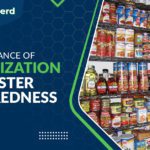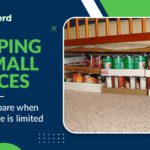Whether you’re new to prepping or have been doing it for decades, it can be difficult to share with close family or friends that you’re focused on preparedness and the things you’re doing to become more prepared. For those who are new to the idea, it can come across as hoarding, and that’s understandable for someone who’s uneducated about the need for preparedness and what it actually entails.
When you start to think about it for yourself, especially as a new prepper, you might wonder what the difference is between hoarding and prepping. After all, both groups seem to be concerned they will need things in the future, and (according to some) both groups seem to be keeping too many items in their home.
So how do you help someone understand that prepping is nothing like hoarding? Or how do you know where you fall on the spectrum of prepping versus hoarding? This article is going to address this head-on.
What is hoarding?
According to an article from the Mayo clinic on hoarding disorder, the following are the signs and symptoms:
- Excessively acquiring items that are not needed or for which there’s no space
- Persistent difficulty throwing out or parting with your things, regardless of actual value
- Feeling a need to save these items, and being upset by the thought of discarding them
- Building up of clutter to the point where rooms become unusable
- Having a tendency toward indecisiveness, perfectionism, avoidance, procrastination, and problems with planning and organizing
Essentially, one can’t simply fill their home with random items and call themselves a prepper. Prepping requires intention of purpose as well as a focus on organization. A vital element of prepping is being able to find what you need and be able to use it when you need it.
As a prepper myself, I understand the motivation to build up my stockpile. However, there are some distinct differences between prepping and hoarding, and reasons why they should never be confused.

True preppers work toward long-term self-sustainability
Prepping is not something you do in a day or a week. Any prepper will tell you that it’s a journey of learning and building toward preparedness and self-sufficiency.
If you’re panic buying, that’s not prepping – it’s simply fear-based decision-making. If you’re “stacking it to the rafters”, simply because you fear that store shelves are going to be empty in a week, that’s not prepping. Again, it’s fear-based decision-making. There may be a time and place for that, but that’s no different than anyone else fearing the same thing and just filling their carts with whatever they fear will be scarce.
To be clear, “stacking it to the rafters”, in a literal sense, may be appropriate based on the types of situations that you’re prepping for. But I would caution against panic buying – prep intentionally, in an organized and balanced way to build a backlog of food that you can rotate through gradually, all of which I will discuss below.
Prepping is not about fear. Prepping is about being prepared for the potential for (or even expectation of) uncertain and challenging times ahead. Prepping is about risk mitigation, something that any rational and reasonable person should be focused on.
True preppers organize their preps
Organization has to be a priority before each purchase. Prepping is not just buying a shopping cart full of canned goods and putting them in your closet. True emergency or SHTF preparedness means you can easily access the supplies you need without digging through endless boxes or piles of junk. If you feel behind on organizing your inventory, check out our proven prep organization system for keeping your supply up-to-date and ready to go.
True preppers have a plan
Prepping is not something you can do in a “point-and-shoot” manner. As explained above, panic buying when alarming news happens is not prepping. Prepping is about stocking up in times of plenty for potential lean times. It’s not motivated by panic – in fact, preparedness is an antidote to panic.
Having a stocked inventory means buying based on needs and balance rather than simply what you see on store shelves. Before you even start purchasing, you should have an awareness of what foods your family eats and enjoys, how many people (and pets) you’re prepping for, and what their needs are. Our system dashboard graphs make it easy to see how much you have and what your gaps (needs) are.
True preppers learn how to store their food
Shelves full of spoiled or stale food won’t do you much good if the time comes that you need to start using your supply. Prepping is not as simple as coming home from the grocery store and unloading your bags into the pantry. Josh Centers of theprepared.com lists the five enemies of shelf life as being heat, light, moisture, pests, and oxygen. Anything that keeps those five things out of your food will only help your supply stay shelf-stable for longer.
Some items, like canned goods, can conveniently be stored as bought. However, many items are better off repackaged for longevity. The Provident Prepper gives a great overview of some options. Mylar bags are a much better option than cardboard boxes for dry goods such as wheat, white rice, beans, pasta, oats, sugar, and flour. Plastic PETE bottles are great for beans or water. Food-grade plastic buckets are great for items you’ll need in bulk like grains, beans, flour, or dry milk.
True preppers minimize waste
A disorganized inventory can mean you’re periodically throwing away a lot of food or supplies that could have been useful if an organized list had been kept. Prepping is not about hoarding as much for yourself as you can and letting things be expendable. Intentional prepping is about making the most of the resources you have and not having to create waste.
Waste can happen in a few different ways in a prep situation:
- You may buy an item that will never get used (usually a fear-based decision)
- You may lose track of what you have and buy things you already have in stock
- You may buy things that will expire or spoil before you’re able to use them
By having a plan (as explained earlier), a prepper buys food that they know their family already enjoys. So the act of prepping is really about having a backlog of the food that you know you’ll eat. A prepper, then, has a system that allows them to efficiently consume their food backlog, and then replace what they eat for future consumption.
Our prep inventory system helps with all of these scenarios – by helping you buy just what you need and by alerting you of items that are approaching their best-by dates, you’re able to minimize waste and always keep a functional inventory at hand.
True preppers obtain and practice using supplies
Prepping is not just about food – in a true disaster situation, you’ll need to think about how you will disinfect water, defend your home, access cash, and function without electricity (as just a few examples). Some of the most shelf-stable food like rice and dried beans will have to be cooked, and depending on where you live you may need a heat source.
Like anything else in your prep inventory, you’ll want to make sure the supplies you have are accessible and functional. Our Ultimate Prep System has the ability to inventory not just food, but also all forms of supplies and equipment (anything non-caloric). It allows you to know exactly what you have and where it is, and you can set reminders to take action with those items (for example, recharging batteries, etc).
True preppers learn and practice survival skills
True preparedness is not just about having the equipment you need, but also knowing exactly how to use each item and what other supplies you may need to make it work. All of the equipment and supplies in the world won’t save you if you don’t know how or when to use them. You may spend a lot of time getting your inventory ready, but the skills you need to keep you and your family safe, clean, and healthy during an emergency situation have to be learned. Our prep system offers you a skills self-assessment tool so you can be aware of areas where you need to grow in your knowledge of survival skills.
Conclusion
If you’re wondering whether you relate with the “hoarder” side of any of these topics, it’s probably time to focus on that area.
- Do you need to focus more on long-term self-sustainability, rather than short-term purchases?
- Do you need to get better organized?
- Do you need to plan better?
- Do you need to hunker down and do the work to properly store your food preps for the longest shelf life possible?
- Do you know you could do a better job minimizing waste?
- Do you acknowledge that you may not actually know how to use some of the supplies and equipment you have stored away?
- Do you need to focus on developing your survival skills?
All of these areas of being true preppers are done one step at a time. Prepping is a journey toward self-sufficiency, and we learn along the way.
Having the best tools available to help us along that journey can be extremely helpful. And that’s exactly why we created the Ultimate Prep System.
We hope to have the opportunity to support you in your preparedness efforts.




The first comment, I am a prepper, fairly involved too. Maybe I should start a youtube channel.
Thanks for the comment Aaron, and I would absolutely encourage you to start a YouTube channel. The prepper community on YouTube is one of the best (if not the best) online communities I’ve ever been a part of. You’ll receive lots of support and encouragement to keep going.
Let me know if you do start a channel. I’d love to check it out!
Thank you for the great read, I am definitely a prepper and like having extra things on hands in my pantry for when I need them. I also love planning a head and wouldn’t be able to relate with being a horder as I love having all my stored items and house items neatly stored and there proper area in the house.
Hoarding just sounds so stressful doesn’t it? Thanks for the comment Jessica!
I think I am a prepper. I do my best to organize.
It seems like there’s always ways to improve organization, doesn’t it? I think the most important benefits are to avoid food waste and being able to easily find everything you have prepped.
Thanks for checking out the post!
Lots of great questions to keep me on track–thanks.
You’re welcome Sue! Thanks for being here!
Prepper. I don’t keep useless items, everything has a purpose.
Love it! Hope the post was helpful
Prepper
Glad to hear it Edward!
Might be time to go look on youtube to find people explaining the difference in videos. Not because I can’t read but because it might be funny to see the comments and video skills.
Thanks for being here Joshua. The prepper community on YouTube is probably the best online community I’ve ever been part of. So much great advice, and such a supportive group of people.
To avoid any confusion, I changed the title of the blog post today from “Are you a prepper or a hoarder?”
Thanks for the tips….sadly I’m a hoarder….but I’m up to change
Thanks for the comment Scott. Being honest with yourself is a great way to spark positive change. I hope the post helped you.
This is so interesting I’ve been wanting to do this for a while. I just didn’t know where to start. It’s smart to be prepared.
Thanks for the comment Drea. I’m open to suggestions / requests for future blog post topics! What would you want to know more about?
I think I’m in between a hoarder and prepped ?
Thanks for the comment Rachael. I hope the post helped you figure out your best steps to move more in the prepper direction :)
i think im in the middle of both. i save everything but i think it will pay off in the long run
Thanks for the comment Michael. I hope the post was helpful.
This is a great resource!
Glad to hear that it’s helpful! Let me know if you have any topic suggestions / requests.
I had a family member who was a hoarder. He is gone now . But seeing how much he kept makes you think. I can’t even see anything on the table.
Hi Tina. I can relate. That was a big motivation in writing this blog post. Being prepared is a healthy activity and I wanted to point out some of the ways that is the case, in contrast with the hoarder stereotype that we can sometimes be associated with by people who don’t know better.
Thanks for the comment!
My dad is a straight up hoarder but trying to get him more into a prepper mindset for the future.
I wish you the best of luck with that. I wonder if this article may be something that would help? If there’s something else I can write about that would be helpful for this, please let me know. I’m sure there are many people who deal with this.
Great website here!
Thanks Jeremy!
I have to admit i am a hoarder when it comes to food , but a prepper otherwise. Growing up money was tight and food was scarce. so now I am married with 1 child and I always buy too much food. Thinking what if I can’t make it to the store. Or what if we run out. I end up throwing out stuff cause it turns bad.
Hi Edward, I appreciate your comment, and I hear where you’re coming from.
I don’t know if you’re aware but this is a big reason I built the Ultimate Prep System. You start with deciding your prep goal, in terms of days worth of food for you and your family, and the system tells you how far along you are toward that goal. It also helps you rotate through food by providing alerts for best by dates.
I hope you’ll check it out and save some money.
This is my biggest concern with this process. Is where do I draw the line between being a prepper and being a hoarder and how do I explain that to those that question it. Thank you for this guide.
Hi Joshua, thanks for the question. In my view, if you’re doing the following, you’re a prepper, regardless of your own personal goals with preparedness:
That doesn’t mean you have to be doing everything perfectly. But you’re working toward improving in each of these areas.
Whether you are preparing for a month, a year, 5 years, or indefinite (off-grid self-sustainability), that’s your own personal preparedness goal. The length of time you’re preparing for doesn’t mean you’re a hoarder vs prepper; it’s the approach you’re taking to meeting that goal that matters most.
Plus a hoarder would buy just to buy, and likely has no idea how many days of sustenance they even have. So there’s no way for them to know whether they’ve met their goal (if they even have one).
I hope this helps. The prep inventory system I offer is a great way to get yourself organized and intelligently work toward your prep goals. You may want to check it out.
My house only looks like a hoarding catastrophe because I live in a 250sqft RV, but it’s sometimes difficult to get it all inventoried, categorized, into totes/buckets and carted off to storage when I have my prep partner here to help (about once a month) because some things get incredibly heavy and of course he is a truck driver and can Tetris things around into the storage unit really well.
Completely understandable! It sounds like you have a good plan as far as storing it longer term. I appreciate the comment Julie!
I’m an aspiring prepper, recovering hoarder. The difference is very obvious when you know what you’re looking at.
Hi Wendy, thanks for being here and for the comment! I hope the post was of interest and value to you.
I’m not the best prepper but I am definitely not a hoarder. I turned my spare bedroom into a pantry with shelves holding tons of packaged foods and toiletries. I go through the lot about every 3 months or so to make sure items with nearing expiration dates get used up or donated. I have successfully froze quite a bit of produce this year and am looking forward to using it this fall and winter.
Awesome! Thanks for the comment Cathy! Let me know if there are any topics I can write on that would interest you in the future.
Well thought out post. Glad I read it. Panic buying is not the way to prep. Buying things to possibly barter in the future in my opinion is not a good idea. Buy what will be eaten.
Great to hear the post was helpful! Thanks for the comment!